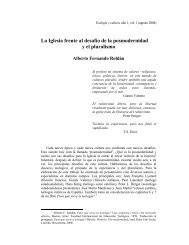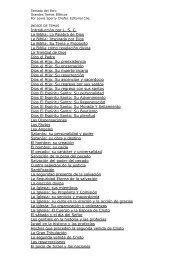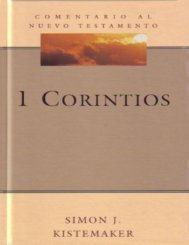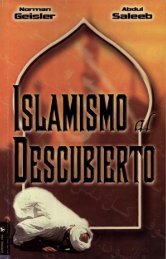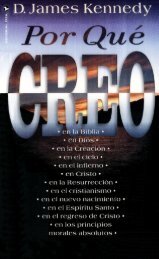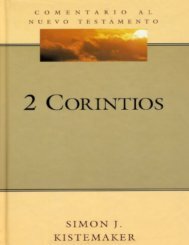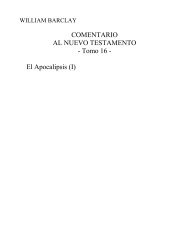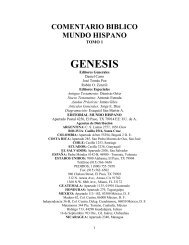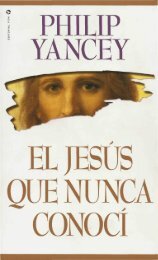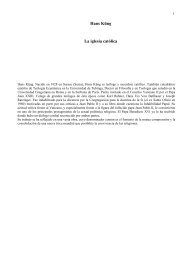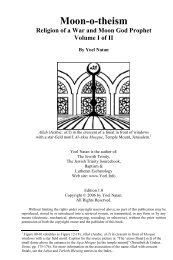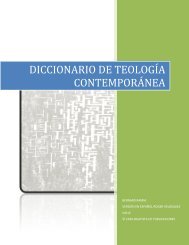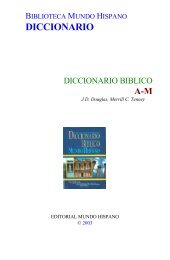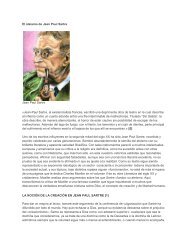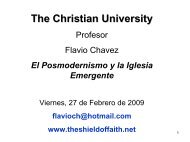¿Quien-creo-a-Dios? de R. Zacharias-N. Geisler
¿Quien-creo-a-Dios? de R. Zacharias-N. Geisler
¿Quien-creo-a-Dios? de R. Zacharias-N. Geisler
You also want an ePaper? Increase the reach of your titles
YUMPU automatically turns print PDFs into web optimized ePapers that Google loves.
NOTAS 269<br />
11. Ibid, p. 178.<br />
12. Por discusión véase «Naturalism and Cosmology»<br />
[Naturalismo y cosmología] en Naturalism: A Critical<br />
Appraisal, ed. Wm. L. Craig y J.P. Moreland, Routledge Studies<br />
in Twentieth~Century Philosophy, Routledge, Londres, Gran<br />
Bretaña., 2000, pp. 215~52.<br />
13. Stephen Hawking, A Brief History of Time [Una breve historia<br />
<strong>de</strong>l tiempo], Bantam, Nueva York, NY, 1988, pp. 140-41.<br />
14. Arthur Eddington, Space, Time, and Gravitation [El espacio, el<br />
tiempo y la gravitación], reimpresión. ed. Cambridge<br />
University Press, Nueva York, NY, EE.UU., 1987, p. 48.<br />
15. Ibid, p. 181.<br />
16. Stephen Hawking y Roger Pemose, The Nature of Space and<br />
Time [La naturaleza <strong>de</strong>l espacio y el tiempo], The Isaac<br />
Newton Institute Series of Lectures, Princeton University<br />
Press, Princeton, N], EE.UU., 1996, pp. 3-4, 121.<br />
17. ]ohn D. Barrow, Theories of Everything [Teorías para todo],<br />
Clarendon, Oxford, Gran Bretaña, 1991, pp. 67-68.<br />
18. Hawking y Pemose, The Nature of Space and Time [La natura~<br />
leza <strong>de</strong>l espacio y el tiempo], p. 20.<br />
19. Andrei Lin<strong>de</strong>, que piensa que el mo<strong>de</strong>lo <strong>de</strong> Steinhardt «está<br />
plagado <strong>de</strong> numerosos problemas no solucionados», se queja<br />
<strong>de</strong>l escenario cíclico/ekpirótico es «muy popular entre los<br />
periodistas» pero «bastante impopular entre los científicos»,<br />
«Cyclic Universe Runs into Criticism», Physics WOTld, junio<br />
<strong>de</strong> 2002, p. 8.<br />
20. J.M. Wersinger, «Genesis: The Origin of the Universe»<br />
[Génesis: El origen <strong>de</strong>l universo], National FOTum, invierno <strong>de</strong><br />
1996.9, 12. Wersinger aparentemente intenta evitar el origen<br />
absoluto <strong>de</strong>l universo <strong>de</strong> la nada apelando a una fluctuación en<br />
el vacío, una i<strong>de</strong>a que ha resultado insostenible, como explico<br />
en el artículo referido en la nota 19.<br />
21. John Barrow, The World Within the World [El mundo <strong>de</strong>ntro <strong>de</strong>l<br />
mundo], Clarendon, Oxford, Gran Bretaña, 1988.<br />
22. Paul Davies, «God and Time Machines» [<strong>Dios</strong> y las máquinas<br />
<strong>de</strong>l tiempo], Books and Culture, marzo/abril <strong>de</strong> 2002, p. 29.<br />
23. ]ohn C. Polkinghorne, Serious Talk: Science and Religion in<br />
Dialogue [Hablando en serio: diálogos entre la ciencia y la reli~<br />
gión], SCM Press, Londres, Gran Bretaña., 1996, p. 6.<br />
24. Debo esta observación al filósofo <strong>de</strong> la ciencia Robin Collins.<br />
25. Ludwig Botzmann, Lectures on Gas Theory [Presentaciones<br />
sobre la teoría <strong>de</strong>l gas], trad. por Stephen G. Brush, University<br />
of California Press, Berkeley, CA, EE.UU., 1964, pp. 446~48.<br />
26. Fred Hoyle y Chandra Wickramasinghe, Evolution from Space<br />
[Evolución <strong>de</strong>s<strong>de</strong> el espacio], Simon & Schuster, Nueva York,<br />
NY, EE.UU., 1981, p. 24.<br />
27. Charles B. Thaxton, Walter L. Bradley y Roger Olsen, The<br />
Mystery of Life's Origin [El misterio <strong>de</strong>l origen <strong>de</strong> la vida1,<br />
Philosophical Library, Nueva York, NY, EE.UU., 1984.<br />
28. Francis Crick, «In the Beginning ... » [En el principio ... ],<br />
Scientific American, febrero <strong>de</strong> 1991, p. 125.<br />
29. Nathan Aviezer, In the Beginning [En el principio] Katv<br />
Publishing House, Hoboken, NJ, EE.UU., 1990.<br />
30. Phillip E. ]onson, Darwin on Trial Uuicio a Darwinl,<br />
Intervarsity Press, Downer's Grove, IL, EE.UU., 1991. El<br />
movimiento <strong>de</strong> diseño inteligente, cuyos lí<strong>de</strong>res incluyen<br />
William Dembski, Stephen Meyer, Paul Nelson, Michael Behe<br />
y Jonathan Wells, recalca la necesidad <strong>de</strong> un agente inteligen~<br />
te <strong>de</strong>trás <strong>de</strong> la complejidad biológica, sin pronunciarse sobre<br />
las cuestiones <strong>de</strong>l intervencionismo (creacionismo) y el teísmo<br />
(<strong>Dios</strong>).<br />
31. Michael Denton, Evolution: A Theory in Crisis [La evolución:<br />
una teoría en crisis], Arlet & Adler, Bethesda, MD, EE.UU.,<br />
1985, cap. 8 y 9.<br />
32. Barrow y Tipler, The Anthropic Cosmological Principle [El prin~<br />
cipio cosmológico antrópico], pp. 561-65.<br />
33. Ibid, p. 133.<br />
34. Michael Behe, Darwin's Black Box (La caja negra <strong>de</strong> Darwin],<br />
Free Press, Nueva York, NY, EE.UU., 1996.



